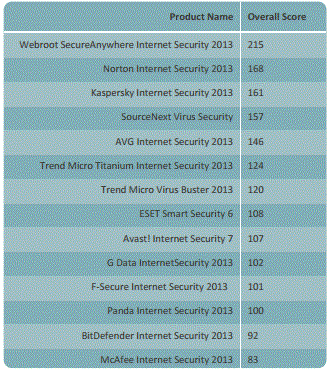F-Secure-performance hog or light as a feather?
Apart from its price, one of the criticisms against F-Secure is that it is too heavy in performance.
IME, up to at least 2011, running the program in real-time was like trying to run in molasses. Results here with F-Secure AV 2010 revealed benchmark tests towards the middle/bottom of the vendors tested; http://antivirus.raymond.cc/
So lots of potential users have stayed away from F-Secure due to this reason without giving the newer versions a chance; a very similar scenario to Norton products. So what is reality?
A relatively recent test;
1. BenchMark Tests-April 2013-by Passmark Software; http://www.passmark.com/ftp/totalprotectionsuites-may2013.pdf
F-Secure IS 2013 was tested in 17 Benchmark categories and could only achieve 11th position out of 14 Security Suites tested. Webroot and Norton leading the way; Windows 7, Ultimate Edition (64-bit) SP1.

More recent performance tests have revealed a better picture;
2. AV-Test has measured performance by how much the antivirus's resource usage slows the system down overall. F-Secure IS scored 4.5/6 on Windows 7(=8th out of 25 vendors) in July/August 2013 and 4/6 on WinXP in October 2013(10th out of 24 vendors). Again Symantec/Norton and Webroot led the way.

3. AV-comparatives has also carried out performance tests on F-Secure from 2009-2013 and overall F-Secure has scored well even in the early years; the overall trend for F-Secure here is very good and is on par with Webroot which is well known to be a low footprint program;



Overall, it is difficult to judge the performance of F-Secure as the results are somewhat variable from the different sites; if you looked at av-comparatives you probably would judge it as a light-weight program; not so by Passmark's tests.
Comments
-
Memory usage of about 140MB Working memory with 8 running processes. This contrasts with some other “lightweight” scanners;

Avast IS-3 processes-17MB RAM; Bitdefender IS-5 processe-13MB RAM; Webroot SecureAnywhere-2 processes-4MB RAM, Norton Antivirus-3 processes-60MB RAM (Figures all from WIN 7, i-7 laptop ).
But most machines should not be limited by RAM unless you have a very old machine and you need to keep an eye more on I/O Reads and Writes and CPU time for performance.
Using Apptimer, http://www.passmark.com/products/apptimer.htm I had a look at some startup times of some programs by F-Secure and some other vendor’s Security programs.
Computer; Intel Core, i-7 3520M CPU, @2.9Ghz, 6GB RAM, Win 7 SP1 64-bit, Windows Experience Index 5.9
Tested with apptimer, mean of 10 runs, of browsers, e-mail and media player.
Vendor
Chrome
Firefox
Opera
Outlook
Windows Media Player
F-Secure IS
0.1771
1.0612
0.4152
0.3405
0.0934
Avira AVS
0.2335
0.6845
1.1196
0.3785
0.1056
Norton AV
0.2055
0.6556
0.4519
0.2755
0.1212
Webroot
0.1976
0.5768
0.5122
0.3866
0.1311
Results shown are launch times in seconds
There may be some quantitative differences in some of the data shown above, BUT the differences are so small that in real-time you will notice very little difference between the scanners.
Overall, if you have a computer less than 2-3 years of age you should be able to run most of the current Antivirus/Internet Security suites available. IME, with testing over the last few months on different snapshots I have found very little difference in performance “feel” between F-Secure and Avira/Avast/Bitdefender/Kaspersky/Norton and Webroot. Only early versions of KIS 2014 have caused any slowdowns on this laptop.
Because of different hardware/software combinations, a program may run well on one machine and not very well on another. But if you have a relatively new computer, F-Secure should run well.
-
@Blackcat wrote:Because of different hardware/software combinations, a program may run well on one machine and not very well on another. But if you have a relatively new computer, F-Secure should run well.
I think that's hitting the nail on the head. In the last six years or so, I've used various incarnations of FSIS, KIS and BitDefender, and although it has the most running processes, I've always found FS to be the least resource zapping of those three. In my experience, on my machines, with my software configurations, KIS definitely slows down web browsing, and takes nearly 60 seconds longer to start up than FS. BitDefender 2013 totally killed my laptop, and rendered it non-functional, due to the time it took to do anything, and even on my desktop PC, the 2014 version, although in no way as detrimental as the 2013 version on my laptop, did slow things down, and often caused a 'double boot' when starting up the machine. I only really noticed the difference when coming back to FS in the last six months, which immediately resulted in better overall performance from my PC.
To be fair, though, the above comparisons were all using a rather tired Windows XP installation, and I'm now on Windows 7. That said, the switch back to FS was when I was still using XP, so I think the comparisons still stand.
-
Regardless of what other say or benchmark indicates F secure Internet security 2014 is very less resource hungry. Don't look at old benchmarks.
Recently i tried to switch to trend micro . but trend micro was very resource hungry compared to f secure.
In terms of memory usage if you have 4 GB RAM then you shouldn't be worried about memory usage. Its even better if security software keep most of the files in RAM.
CPU usage is also very low while scanning. CPU and hard disk usage will skyrocket only when detecting malicious files. that would be problem only if your computer is full of malwares. So for most of the time its not a problem.
F secure performace impact is low while still providing high level of security.
Avast , avg, eset cannot provide this level of security.
Kasperky and trend micro would have high performnce impact.
Bitdefender has issues with blocking internet access.


